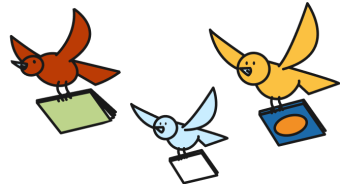
Paul Erdos grew up in Hungary and was always an unusual child. He enjoyed numbers, was inept at everyday activities (like tying his shoes), and hated rules but grew up to be a famous mathematician. Witty illustrations and a fluid narrative (which imbeds mathematical language), and fascinating author and illustrator notes introduce this mathematically gifted man.
The Boy Who Loved Math: The Improbable Life of Paul Erdos

Math is not only all around but everyday goings-on make thinking mathematically fun. Activities of varying difficulty (wee ones, little kids, big kids) use the familiar — from dogs to ketchup — to present intriguing math questions to solve, all humorously illustrated. Answers are discreetly placed on each page with additional information for adults at the end.
Bedtime Math

Bright colors and simple patterns on sturdy pages present simple images of familiar farm animals, enhanced by textured paper. On the opposite side of each page is a pattern that incorporates the animal.
Farm

What do a cricket, a turtle, an opossum, a flea, and a frog have in common? Each are featured in a story that comes from one of the indigenous people that live in Mexico. Fluid retellings combine with information about the natives from whose culture the tales were drawn. A glossary and where to go for additional information and sources are included in this attractively illustrated book.
Whiskers, Tails and Wings: Animal Folktales from Mexico

The familiar fable of competition between a speedy, arrogant hare and a plodding, perseverant tortoise is retold in dramatic, highly detailed illustrations by the artist of the Caldecott winner, The Lion and the Mouse (opens in a new window). Here, too, few words are needed to reveal the setting and different personalities of the main characters and the animals who watch the race, in this altogether handsome telling.
The Tortoise and the Hare

Two of three pigs, paid for their work by the Florida-bound farmer, enjoy chips and “sody-pop” more than a sturdy home. Only one is smart enough to grow healthy food and with her pay build a brick house with a pool. This funny, nonviolent riff on a familiar tale makes a gentle comment about healthy food and hygiene and its impact on huffing and puffing!
The Three Little Pigs and the Somewhat Bad Wolf

Ten princess tales are retold in verse accompanied by highly detailed illustrations that encourage close examination. The lush illustrations place princesses in unique settings, affirming their universal appeal. “The Princess and the Frog”, for example, is set in China; the princess whose sleep is disturbed by a single pea under many mattresses appears in an African county.
Princess Tales: Once Upon a Time in Rhyme with Seek-and-Find Pictures

A prairie chicken named Mary McBlinken, “heard a rumbling and a grumbling and a tumbling” fearing that “a stampede’s a comin’!” Others join her to alert Cowboy Stan and Red Dog Dan to the impending danger. Almost sidetracked by a tricky coyote, Stan and Dan save the day and stop the rumbling of Mary’s tummy. A take-off of “Chicken Little” is made even more humorous by rib-tickling illustrations.
Prairie Chicken Little
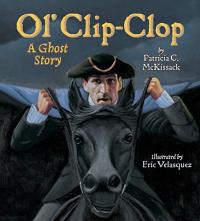
In 1741, mean-hearted John Leep set out to evict a tenant on Friday, October 13th on a cold and very dark evening. As Leep clip-clops to the widow’s house on his horse, hoof beats are matched by an unseen rider to and from the house. Dark, dramatic illustrations enhance the truly spooky story with an unexpected ending sure to make readers or listeners jump.
Ol’ Clip-Clop: A Ghost Story

When Nelly May takes a job as housekeeper for Lord Ignasius Pinkwinkle, she must learn a new vocabulary. Lord Pinkwinkle becomes “Most Excellent of All Masters,” his bed a “restful slumberific” and so on — until she must put it all together to save the Master and his home. Jauntily illustrated, a fresh version of an old English tale is sure to engage children.
Nelly Has Her Say

Two friendless creatures with “brains no bigger than a pebble” vow not to hurt the other. But when the crocodile takes the scorpion to the other side of the river, there is little doubt that they both wind up at the bottom of the “big, brilliant blue river.” A brief telling of a little-known fable combines with abstract, angular and brilliantly colored illustrations for a memorable tale.
The Crocodile and the Scorpion

Little Chick is not distracted like his mother, Mama Nsoso. He only chases tasty treats after their ilome, a warm new home of grass and mud, for his family is complete. This lively telling based on a fable told by Nkundo people of Central Africa is illustrated with swirling, animated illustrations, complementing the alliterative, onomatopoeic language.
Busy-Busy Little Chick

Musa ventures out alone for the first time to collect firewood, where a loud noise and the dark forest frighten him. A squirrel and a cow calm the panicky boy who returns home safely without any wood — but with a good story to tell. Highly stylized folk art effectively conveys Musa’s emotions in a fast-paced story and introducing a tradition of central India.
Alone in the Forest

Charles Darwin came across a distinctive frog in Chile during his ventures on the Beagle. The exceptional characteristics and the mysteries it created are presented in engaging text, photographs and notable, realistic collage illustrations. Additional resources are included.
The Mystery of Darwin’s Frog
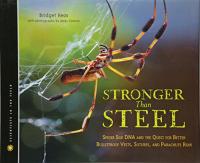
The strength of Spiderman’s web wasn’t far from reality. Biologist Randy Lewis’ work proves it. A highly readable text and captivating photographs make a complicated topic, related issues, and current research understandable for sophisticated readers of all ages.
Stronger than Steel
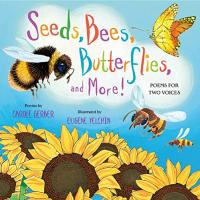
Poems intended for two voices celebrate nature and how its creatures are interrelated. Seeds helicopter, hitchhike and travel by bird; worms snack; snails leave trails and more in playful verses made more accessible by the large, colorful, almost whimsical illustrations.
Seeds, Bees, Butterflies and More! Poems for Two Voices
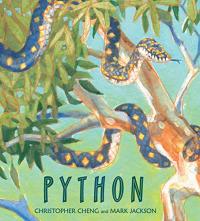
Like most snakes, pythons are often vilified. Realistic watercolors, however, of a Diamond Python (native to Australia) and informative text present a slice of her life from warming in the sun to hatching eggs — and, of course hunting and eating.
Python

Interesting factual tidbits inspired imaginative animal portraits. The strong graphic design on large pages encourages close reading so that “while the creatures …may look a little silly, they are all based on real animal facts.”
Paul Thurlby’s Wildlife

Meet different kinds of monkeys — all of which come in many colors — shown in crisply lined, full-color illustration and brief text. Additional information about each of the 12 monkeys introduced and a world map concludes this brief, enticing introduction.
Monkey Colors
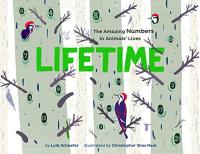
In one lifetime, creatures presented will grow or show one behavior repeatedly. Limited text combines with textured illustration to reveal these estimates from one papery spider egg sac to a thousand baby seahorses. Animal and math information conclude this unique glimpse of animals.
Lifetime: The Amazing Numbers in Animal Lives

Meet a panda, moon bear, sloth bear, sun bear, and other kinds (plus a teddy bear) in simple rhyming text and gentle illustrations. Bear facts and where to find additional information conclude this easy informational picture book.
If You Were a Panda Bear

Rhythmic text and lush illustrations invite young readers (or listeners) to eat like a bear from April until midwinter. Textured illustrations and more thorough backmatter conclude this engaging introduction to brown bears and their habitat.
Eat Like a Bear

Bats come in different sizes with different characteristics but each serves a particular purpose. Crisp photographs and lucid writing provide a riveting introduction to these often maligned creatures.
Bats: Biggest! Littlest!

With simple words and clear pictures, this bilingual picture-book biography introduces young readers to the Mexican American leader who led the labor struggle of poor migrant farm workers. Beginning with Chavez’s early childhood on his parents’ farm in Arizona, the biography tells of the family’s time as migrant workers during the Depression, and then of Chavez’s long years working to organize the United Farm Workers and fight violence and discrimination. Inspired by Gandhi, Chavez always insisted on nonviolence, and the stirring pages show him on a hunger strike and leading labor strikes and boycotts.
